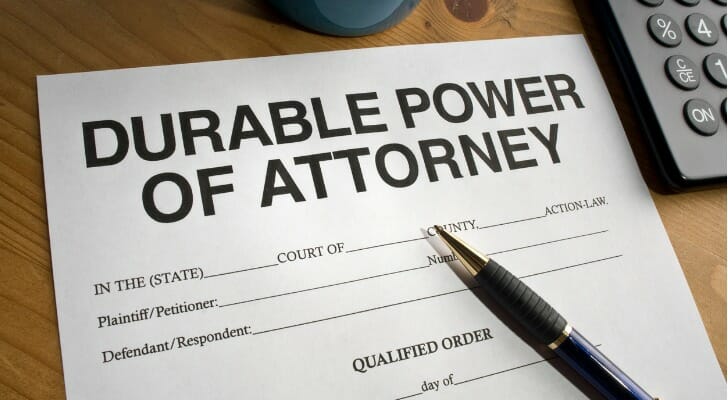 When you assign someone power of attorney you give them the authority to make decisions for you and on your behalf. Whatever the agent, as this person is called, decides will be as binding as if you’d made the decision yourself, so only give power of attorney to someone you absolutely trust. While a specific form is unnecessary for power of attorney, just about every jurisdiction offers one in order to help you understand this process. Here’s what you need to know.
When you assign someone power of attorney you give them the authority to make decisions for you and on your behalf. Whatever the agent, as this person is called, decides will be as binding as if you’d made the decision yourself, so only give power of attorney to someone you absolutely trust. While a specific form is unnecessary for power of attorney, just about every jurisdiction offers one in order to help you understand this process. Here’s what you need to know.
Consider working with a financial advisor as you create an estate plan that includes creating a power of attorney and naming a grantor.
What Is Power Of Attorney?
Power of attorney is a vast assignment of authority.
When you give someone power of attorney, you are handing them the right act for you in a legal capacity. They have the right to enter into contracts on your behalf, manage your finances, buy and sell your property, make medical decisions and generally make most decisions that you’re legally entitled to. Someone with power of attorney can make just about any legally enforceable decision that you can.
People typically rely on power of attorney when they can’t make or enforce their own decisions. Most often this has to do with old age, mental infirmity or some other form of mental incapacity. If someone physically can’t act for themselves (such as someone in a coma) or lacks the mental capacity to understand their own affairs (such as someone with advanced Alzheimer’s), someone may assume power of attorney to help keep their affairs in order.
In other situations people will assign power of attorney for someone to speak on their behalf when they can’t be present. For example, often litigants will assign their lawyers power of attorney to settle a case on their behalf they aren’t in the room. Or someone may assign power of attorney if they will be out of the country for a long period of time, and too far out of reach to manage their own affairs.
When assigning power of attorney you can specify the scope of your assignment. Getting this right is extremely important since the grant of authority can be vast. Unless you’re careful, it’s easy to sign away far more power than you intended.
The most common assignments include:
- General Power of Attorney – This allows the holder to make virtually all legally enforceable decisions as though you had made them yourself. They can open accounts in your name, sell assets, enter contracts and generally act in your stead.
- Limited Power of Attorney – Sometimes known as special power of attorney. In this case you have specified the exact decisions that the holder can make on your behalf. For example, in our case above, you might give your lawyer power of attorney to settle a lawsuit on your behalf. Or you might give someone power of attorney in regards to the sale of a house. This assignment is generally construed narrowly, meaning anything you leave out is considered reserved to you.
- Medical Power of Attorney – You have authorized the person to make medical decisions for you if you are physically unable (such as in a coma) or mentally unable (if a doctor has deemed you mentally unfit).
- Financial Power of Attorney – You have authorized the person to make all financial decisions for you. Unless you specify otherwise, this gives them near-total authority to act on your behalf when it comes to your money, property and other assets. A common subset of this is tax power of attorney, in which you assign someone (often an accountant) full authority to act in your name with the IRS and other tax agencies.
- Familial/Parental Power of Attorney – You have authorized this person to act as the legal parent or guardian of your child. While this is common in cases of custody disputes, it also can be used if the parent will be away for a long stretch of time. For example, if a single parent has been deployed by the military they may assign their child’s caretaker with familial power of attorney.
Someone with your power of attorney cannot directly supersede or overrule your own decisions unless you have been deemed mentally unsound. However, they can act with your authority, which can cause problems if you intend to manage the same affairs that they will.
How Do You Declare Power of Attorney
 Every state offers a template form for authorizing power of attorney, and you can find yours on this website here. You may also search for forms dedicated to specific assignments of authority. You can also find similar templates here, and through your state’s website. However, while forms are helpful, there is no specific form necessary for declaring power of attorney. You can write your own power of attorney by hand if you choose.
Every state offers a template form for authorizing power of attorney, and you can find yours on this website here. You may also search for forms dedicated to specific assignments of authority. You can also find similar templates here, and through your state’s website. However, while forms are helpful, there is no specific form necessary for declaring power of attorney. You can write your own power of attorney by hand if you choose.
The only strict requirements for a legally binding assignment are:
- The power of attorney assignment must be in writing;
- It must specify the scope of authority, otherwise it will be a general power of attorney;
- It must be signed by you (the person giving the power of attorney);
- And it must be officially notarized.
Note that unlike many legal documents, a simple signature will not suffice. You can make a contract or even a will on the back of a cocktail napkin, but power of attorney must be notarized. If not, third parties will reject it. While laws like this are typically highly specific, this writer is unaware of any jurisdictions that deviate from this rule.
The one exception to this rule is if you have been deemed mentally unsound by a doctor or court. In this case, power of attorney will be assigned to a caretaker on your behalf.
You do not need a lawyer to assign someone power of attorney, although we strongly advise that you consult one. Most law firms will also have a notary on staff as well, making that step easier.
To declare power of attorney you must be legally sound of mind. If a doctor or judge has declared you incompetent to make your own decisions, a power of attorney assignment will not be valid. If someone wants to challenge power of attorney they can also attempt to show that you were not of sound mind when you made the assignment. This would be a matter for a court to decide.
You can revoke power of attorney at any time, by any means. You do not have to notarize or even write down this revocation. That said, you should do so. If you have formally assigned power of attorney, you should formally revoke it. This ensures that there is no dispute as to if and when this authority ended.
Sunset Clauses, Durability and Springing Power of Attorney
 Under ordinary conditions, power of attorney will no longer have effect if you become mentally or physically incapacitated. This is true even if you signed the form while mentally sound. (This allows any necessary next steps to move forward, uncomplicated by a pre-existing grant of authority.) To prevent this you can add what is known as a “durability” clause to your power of attorney form. This clause can state that your power of attorney will remain in effect if you are deemed incompetent.
Under ordinary conditions, power of attorney will no longer have effect if you become mentally or physically incapacitated. This is true even if you signed the form while mentally sound. (This allows any necessary next steps to move forward, uncomplicated by a pre-existing grant of authority.) To prevent this you can add what is known as a “durability” clause to your power of attorney form. This clause can state that your power of attorney will remain in effect if you are deemed incompetent.
You can also write a durable power of attorney that does not take effect unless you are deemed mentally incompetent. This is one way that people protect themselves against illness or infirmity, by establishing in advance who will have their power of attorney if anything happens to them. For example parents often create a durable familial power of attorney, so that guardianship of their children transfers automatically if anything happens to them.
Springing power of attorney is similar to a durability clause. This takes effect (or “springs into effect”) if a specific condition is met. For example a soldier might set a financial springing power of attorney that takes effect whenever they have been deployed.
Finally, you can write sunset clauses into your power of attorney. This specifies the conditions under which the power of attorney ends. Most often people will use a set amount of time, such as a date or length of months after which point the power of attorney automatically expires. Unless you are preparing a durable power of attorney, this is strongly recommended.
The Bottom Line
You can find power of attorney forms through most state and local government websites, or you can write your own. This is a broad grant of authority that can help you manage your affairs whether you are ill, incapacitated or just out of reach. You can hand over the rights to make decisions around matters like healthcare, business decisions or real estate transactions. Durable power of attorney goes into effect right away. Springing power of attorney, on the other hand, takes effect when you become incapacitated.
Tips on Estate Planning
- Good advice can help you in just about any situation. With SmartAsset’s matching tool you can find a financial advisor in your area, in minutes, to help you plan out your own next moves. They may not need to take over your portfolio, but they can help you make good choices for the future. If you’re ready then get started now.
- Your agent may have to make decisions about your 401(k) account. Find out how much money you’ll have in your account by the time you retire with our free 401(k) calculator.
Photo credit: ©iStock.com/Tzido, ©iStock.com/SrdjanPav, ©iStock.com/KLH49